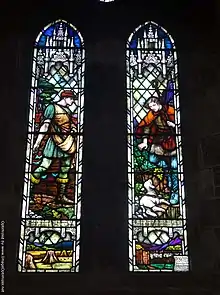Parable of the Sower
The Parable of the Sower (sometimes called the Parable of the Soils) is a parable of Jesus found in Matthew 13:1–23, Mark 4:1–20, Luke 8:4–15 and the Gospel of Thomas, logion 9.


Jesus tells of a farmer who sows seed indiscriminately. Some seed falls on the path (wayside) with no soil, some on rocky ground with little soil, some on soil which contains thorns, and some on good soil. In the first case, the seed is taken away; in the second and third soils, the seed fails to produce a crop; but when it falls on good soil, it grows and yields thirty-, sixty-, or a hundred-fold.
Jesus later explains to his disciples that the seed represents the Gospel, the sower represents anyone who proclaims it, and the various soils represent people's responses to it.
Text
“Listen! Behold, a sower went out to sow. And as he sowed, some seed fell along the path, and the birds came and devoured it. Other seed fell on rocky ground, where it did not have much soil, and immediately it sprang up, since it had no depth of soil. And when the sun rose, it was scorched, and since it had no root, it withered away. Other seed fell among thorns, and the thorns grew up and choked it, and it yielded no grain. And other seeds fell into good soil and produced grain, growing up and increasing and yielding thirtyfold and sixtyfold and a hundredfold.” And he said, “He who has ears to hear, let him hear.”
The explanation given by Jesus.
And when he was alone, those around him with the twelve asked him about the parables. And he said to them, “To you has been given the secret of the kingdom of God, but for those outside everything is in parable,so that
“‘they may indeed see but not perceive, and may indeed hear but not understand, lest they should turn and be forgiven.’”
And he said to them, “Do you not understand this parable? How then will you understand all the parables? The sower sows the word. And these are the ones along the path, where the word is sown: when they hear, Satan immediately comes and takes away the word that is sown in them. And these are the ones sown on rocky ground: the ones who, when they hear the word, immediately receive it with joy. And they have no root in themselves, but endure for a while; then, when tribulation or persecution arises on account of the word, immediately they fall away. And others are the ones sown among thorns. They are those who hear the word, but the cares of the world and the deceitfulness of riches and the desires for other things enter in and choke the word, and it proves unfruitful. But those that were sown on the good soil are the ones who hear the word and accept it and bear fruit, thirtyfold and sixtyfold and a hundredfold.”.
Context
In Mark's Gospel and Matthew's Gospel, this parable, the explanation of the purpose of parables and the explanation of the parable itself form part of Jesus' third or "Parabolic" discourse, delivered from a boat on the Sea of Galilee. In each narrative, Jesus used the boat as a means of being able to address the huge crowd gathered on the lake shore. Luke's Gospel does not use a boat for the delivery of the sermon, but still has Jesus presenting the parable to a large crowd gathered from 'every city' and follows the parable with a question on the purpose of parables and an explanation of the parable of the sower itself.
While the parable was told to the multitude, the explanations were only given to the disciples.
Interpretations
Jesus says that he teaches in parables because many are opposed to his direct teachings. He quotes Isaiah 6:9–10, who preached to Israel knowing that his message would go unheeded and not understood, with the result that the Israelites' sins would not be forgiven and they would be punished by God for them.[1] This parable seems to be essential for understanding all the rest of Jesus' parables, as it makes clear that what is necessary to understand Jesus is faith in him, and that Jesus will not enlighten those who refuse to believe in him.[2]
The parable recorded in Mark comes just after a description in the previous chapter of a developing hostility toward Jesus and his ministry. The Pharisees accused him of not holding to a strict observance of the Sabbath by performing various healings. Some schools of thought found such actions permissible only if the person treated was in danger of death.[3] Some of the Jerusalem scribes contended that Jesus derived his power through demonic sources.
This is then followed in Mark by the Parable of the Growing Seed and that of Mustard Seed. Together, they indicate that it is not about the individual's response to his message, or even the apparent failure of it to take root, but that "in spite of the opposition of enemies of the Kingdom and in spite of the moral and intellectual failings of the Kingdom’s putative friends, the Kingdom will succeed immensely in the end."[4][5] Mark uses it to highlight the effect that Christ's previous teachings have had on people, as well as the effect that the Christian message has had on the world over the three decades between Christ's ministry and the writing of the Gospel.[1]
According to Genesis 26:12–13, Isaac sowed seed and "reaped a hundredfold; and the Lord blessed him. The man began to prosper, and continued prospering until he became very prosperous". Anglican bishop Charles Ellicott thought that "the hundredfold return was, perhaps, a somewhat uncommon increase, but the narrative of Isaac’s tillage in Genesis 26:12 shows that it was not unheard of, and had probably helped to make it the standard of a more than usually prosperous harvest";[6] however, Protestant theologian Heinrich Meyer argued that "such points of detail ... should not be pressed, serving as they do merely to enliven and fill out the picture".[7]
Notes
- Kilgallen p.83
- Kilgallen p.86
- Jacobs, Joseph et al. "Jesus of Nazareth", Jewish Encyclopedia
- "Brown, Peter. "The Mind of the Lord", Our Sunday Visitor, September 1, 2015". Archived from the original on October 11, 2018. Retrieved October 11, 2018.
- Kilgallen p.82
- Ellicott's Commentary for Modern Readers on Matthew 13, accessed 14 January 2017
- Meyer, H., Meyer's NT Commentary on Matthew 13, accessed 14 January 2017
References
| Wikimedia Commons has media related to Parable of the Sower. |
- Kilgallen, John J., A Brief Commentary on the Gospel of Mark, Paulist Press, 1989. ISBN 0-8091-3059-9
- Bruce R. McConkie, Doctrinal New Testament Commentary, Vol. I:289
- James E. Talmage, Jesus The Christ, pg. 263–266
- Martijn Linssen, The Parable of the Sower in Context: against religion
